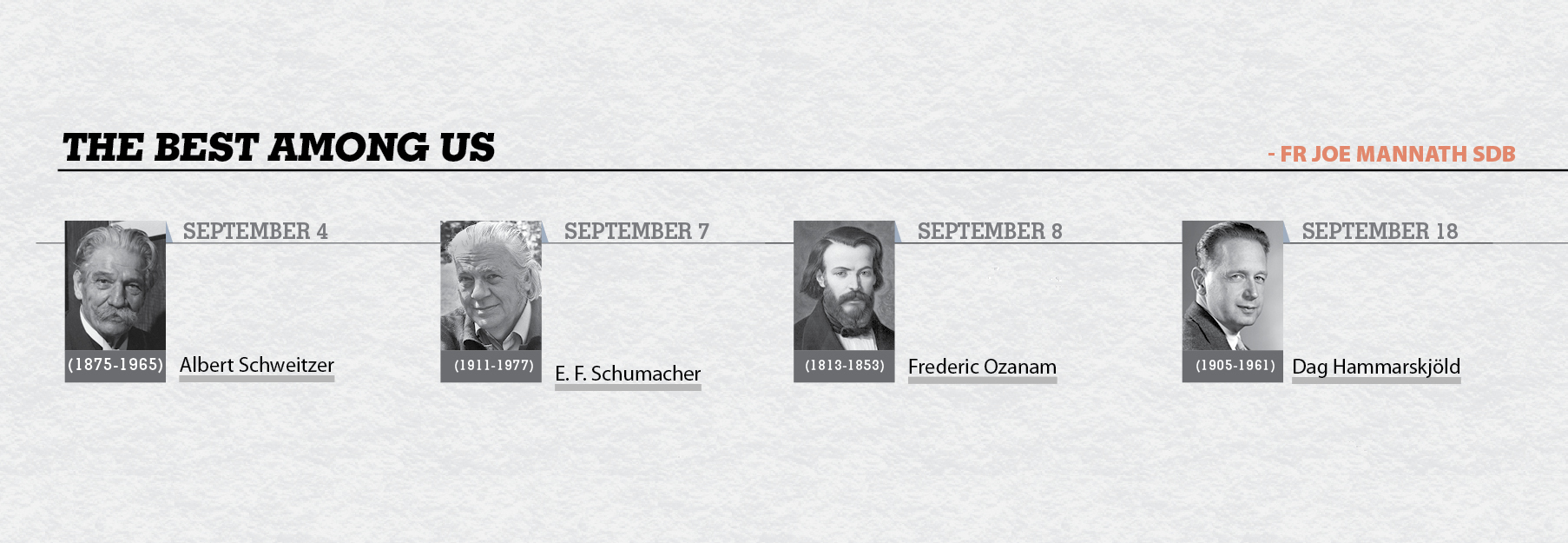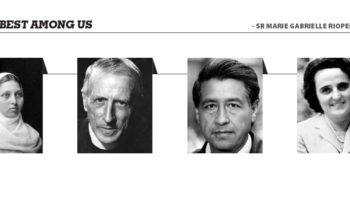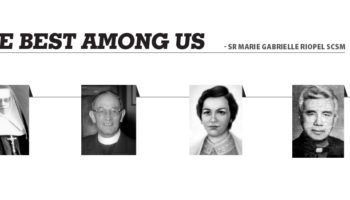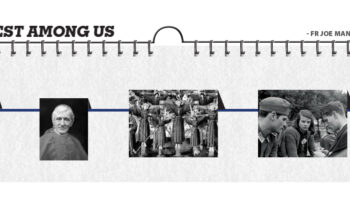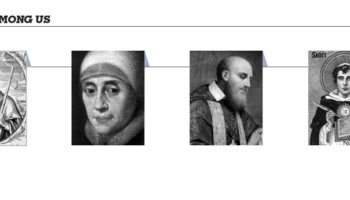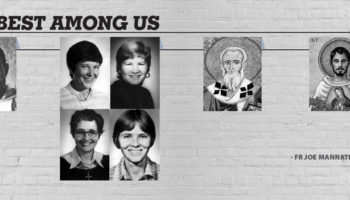This month we look at four lay professionals—a doctor (and polymath), an economist, a professor and a diplomat—whose lives shine as models of humanity. Their death anniversaries occur in September.
September 4
Albert Schweitzer (1875-1965)
Think of an extraordinarily gifted man living at the border of France and Germany. He was not just a theologian and preacher. His book, The Quest for the Historical Jesus, became a landmark that challenged and changed the way scholars approached the subject.
He was not only an organist, but also the greatest authority on the German composer Bach. His book on Bach became a classic. He also wrote about the construction of pipe organs that influenced that field.
Unusually famous in two separate disciplines—theology and music—he decided to quit both!
At age thirty, against the protests of family members and friends who thought him mad, he resigned his professorship and joined the university as a student of medicine! Why? To go to a remote corner of Africa and work as a doctor. He convinced his fiancée of the correctness of his decision, and she studied anesthesia, and later worked with him.
The Paris missionary society did not accept him for work in Africa, considering his theological views unorthodox. So, he raised money to build a hospital.
He went to Lambaréné, in what is now Gabon. Reaching there meant fourteen days of travel by canoe from the port.
He set up a rudimentary hospital, and treated all sorts of diseases.
He was also deeply critical of colonization and the injustices the colonizing European powers had committed against the colonized people. He saw Africans as his brothers and sisters, a very unusual attitude for a European of those days.
Slowly, the world noticed the extraordinary vision and work of this man who shunned comfort and fame and buried himself in an unknown and miserably deprived part of the world. Honours followed, including the Nobel Peace Prize. His acceptance speech is considered one of the most moving. He spoke much on the respect for life, and against nuclear arms.
Schweitzer died in his beloved Lambaréné hospital in 1965.
—————————————————————————————————————————————————-
September 7
E.F. Schumacher (1911-1977)
Have you heard the expression, “Small is beautiful”? Well, that was the title of Schumacher’s first book. Its subtitle reveals his greatest concern: “Economics as if people mattered.” He argued for an economics that would put human beings and not material wealth first. He was convinced that our mindless search for ever-increasing wealth was destructive. Money alone would not satisfy the desires of the human heart. This book was rated as one of the hundred most influential books published since World War II.
A convinced atheist when he was young, he was later drawn to religion. He admired Buddhism, but, influenced by the intellectual vigour of Thomas Aquinas’s thought and the mystical writings of Teresa of Avila and Thomas Merton, he became a Catholic. He saw how his human concerns in economics were found in the Papal encyclicals on social themes.
At a time when the most influential thinking in economics was “the bigger, the better,” Schumacher has the wisdom and the courage to think differently—as if people at all levels really mattered.
—————————————————————————————————————————————————-
September 8
Frederic Ozanam (1813-1853)
Here was a laymen with doctorates in law and economics, a popular professor in Paris, who was distressed by the plight of the poor and the church’s distance from modernity. The French Revolution had spoken of “liberty, fraternity, equality,” but not much fraternity or equality existed between the rich and the poor. The church, in its concern for orthodoxy, seemed to side with the rich.
Thus, when Ozanam started his studies at the university of Paris, he was shocked to the see the bitter enmity of many towards the church. People wanted not arguments and nice theories, but action.
So, Ozanam and a few friends started visiting the poor in the miserable slums in which they lived in utter squalor. They would help them out of the personal sacrifices they had made. Thus was born The Saint Vincent de Paul Society, found now in most Catholic parishes all over the world.
When he raised issues critical of the church and of the establishment, he met with strong opposition. Ozanam was convinced that a society made up a few who have too much and a vast majority who have too little cannot survive. The violent clashes he had predicted occurred in 1848.
The church’s social encyclicals and European governments showing active concern for their poorer citizens would come later. Frederic Ozanam was a pioneer ahead of his times, who paid for his views by facing criticism and isolation. Broken in health, he died at the age of forty.
—————————————————————————————————————————————————-
September 18
Dag Hammarskjöld (1905-1961)
When Dag Hammarskjőld, UN Secretary General, died in an air crash in 1961, they found a manuscript in his house, with this letter: “Perhaps you may remember that I once told you that, in spite of everything, I kept a diary which I wanted you to take charge of someday…These entries provide the only true “profile” that can be drawn…a sort of white book concerning my negotiations with myself—and with God.”
One surprising feature of the diary is that nothing of Hammarskjőld’s brilliant and very public career, or of the tremendous admiration others had for him, appears anywhere. In fact, even his closest friends had no idea that Dag had this “mystical” journey. They knew him as someone who was “true in word and act…very brilliant, orderly, pragmatic and subtle, …capable of lightning speed in both comprehension and construction, yet strictly disciplined.”
No one knew that this brilliant and famous diplomat was, at heart, a deep mystic. His diary, published under the title, Markings, took the world by storm. Here a couple of quotes. We shall see more of them in another issue of MAGNET.
The more faithfully you listen to the voice within you, the better you will hear what is sounding outside. And only he who listens can speak.
God does not die on the day when we cease to believe in a personal deity, but we die on the day when our lives cease to be illumined by the steady radiance, renewed daily, of a wonder, the source of which is beyond all reason.
For all that has been—Thanks! To all that shall be—Yes!
The diary of this wise, good and brilliant man makes us aware that there are, unknown to us, many mystics and saints around us. People are not what they appear to be.

To subscribe to the magazine Contact Us
